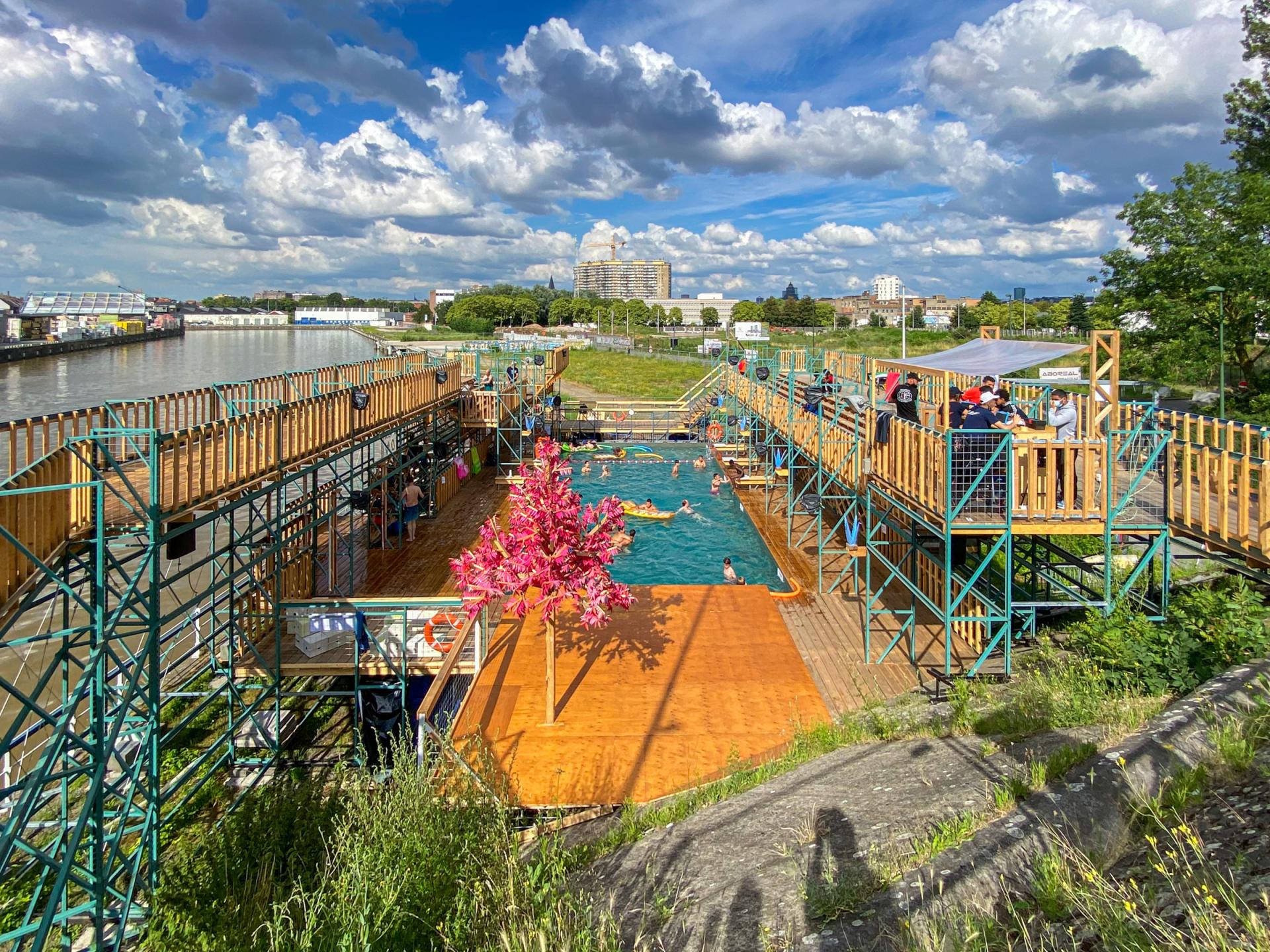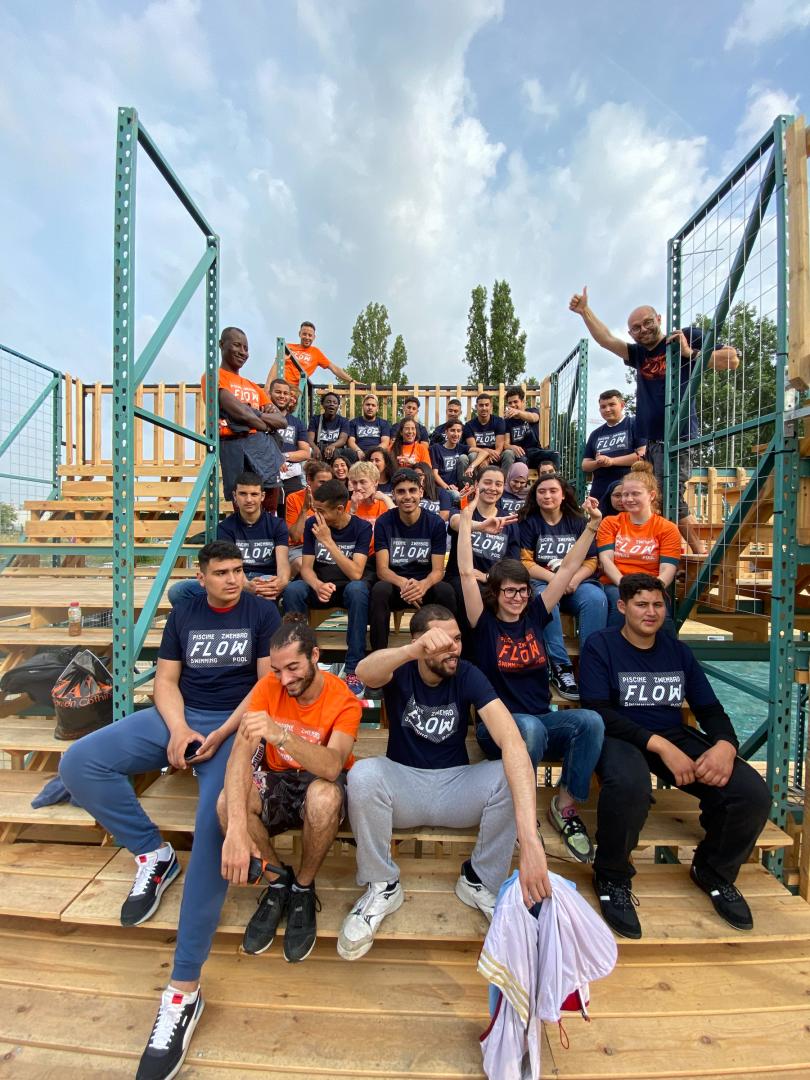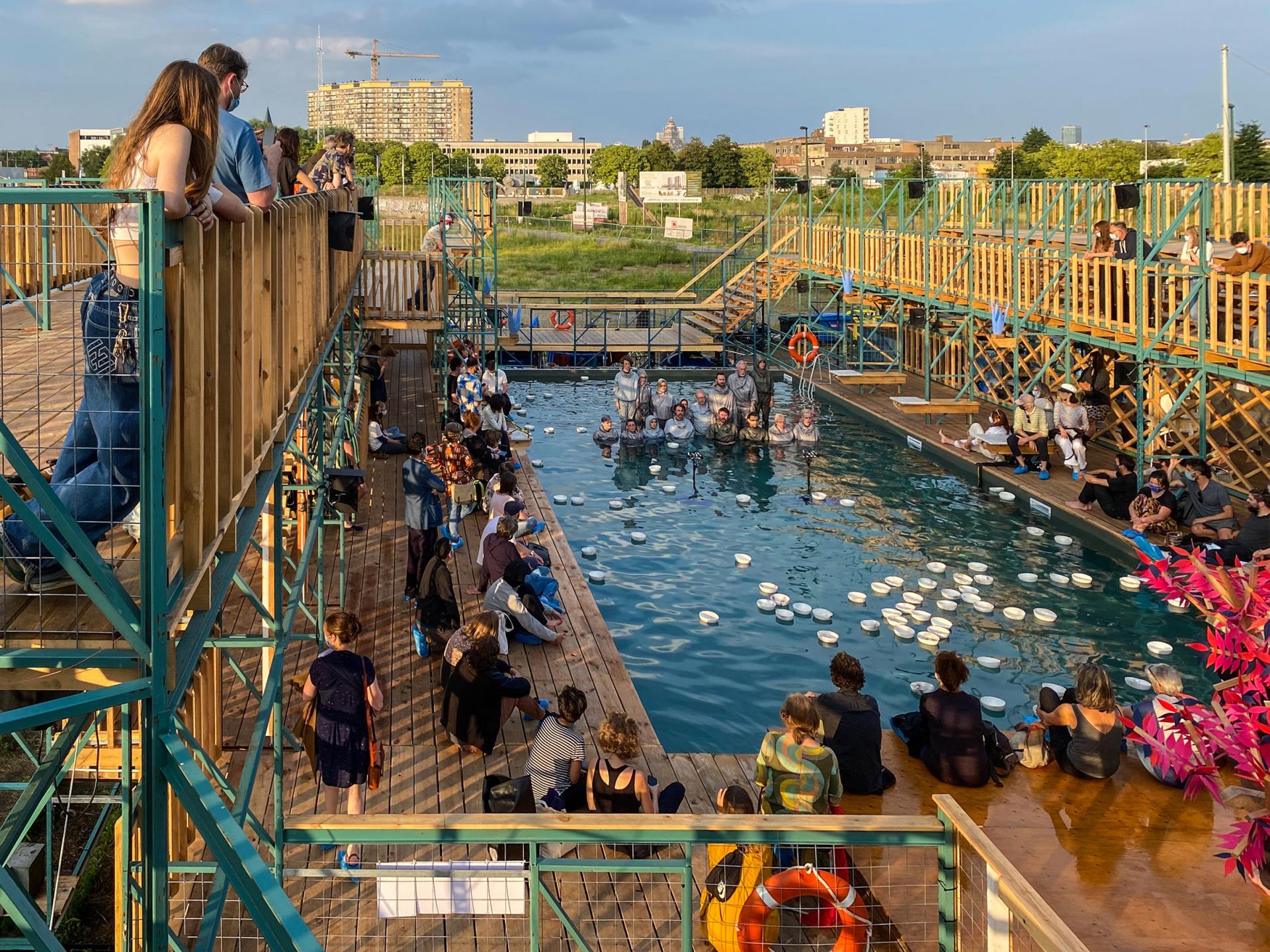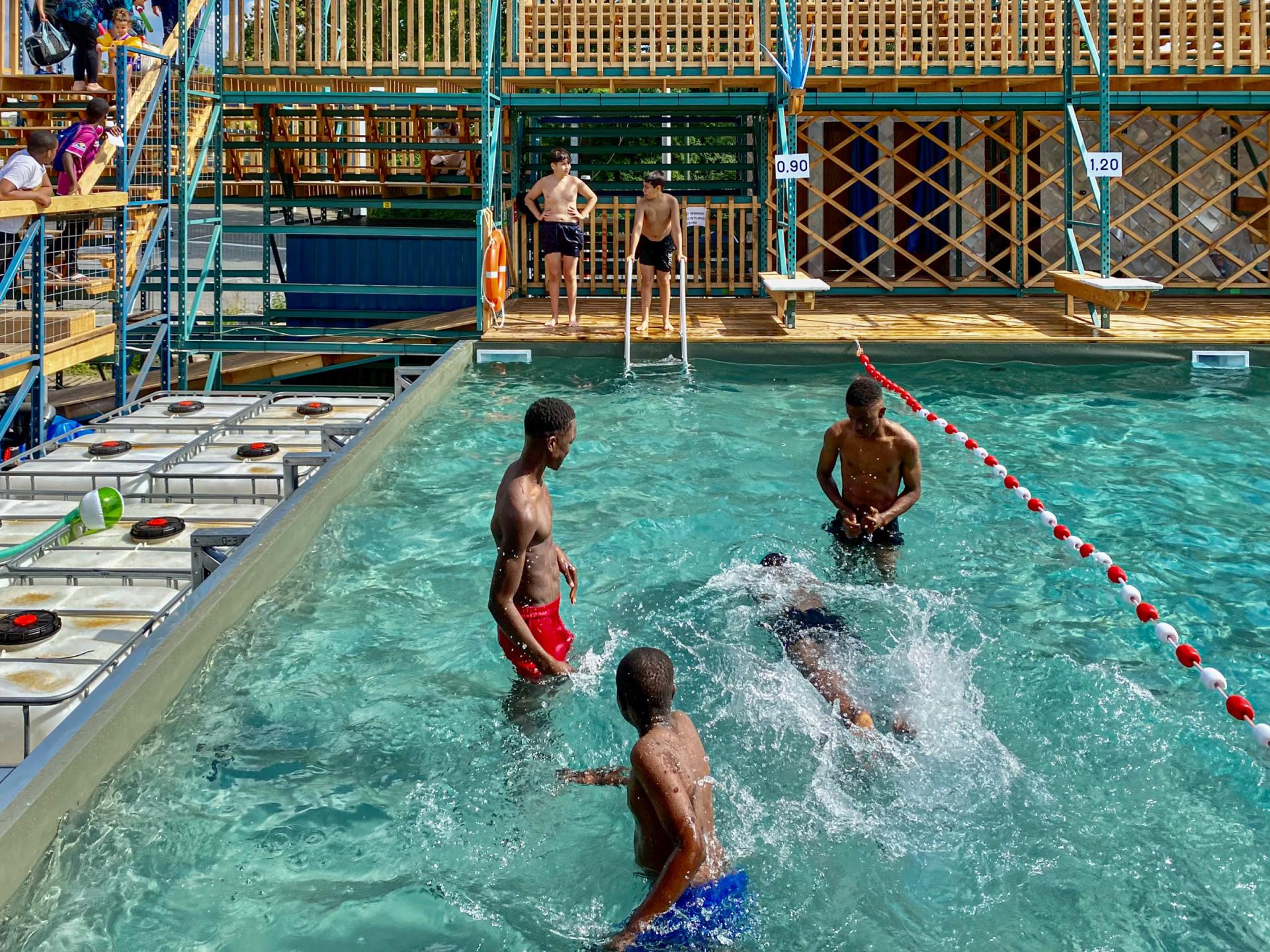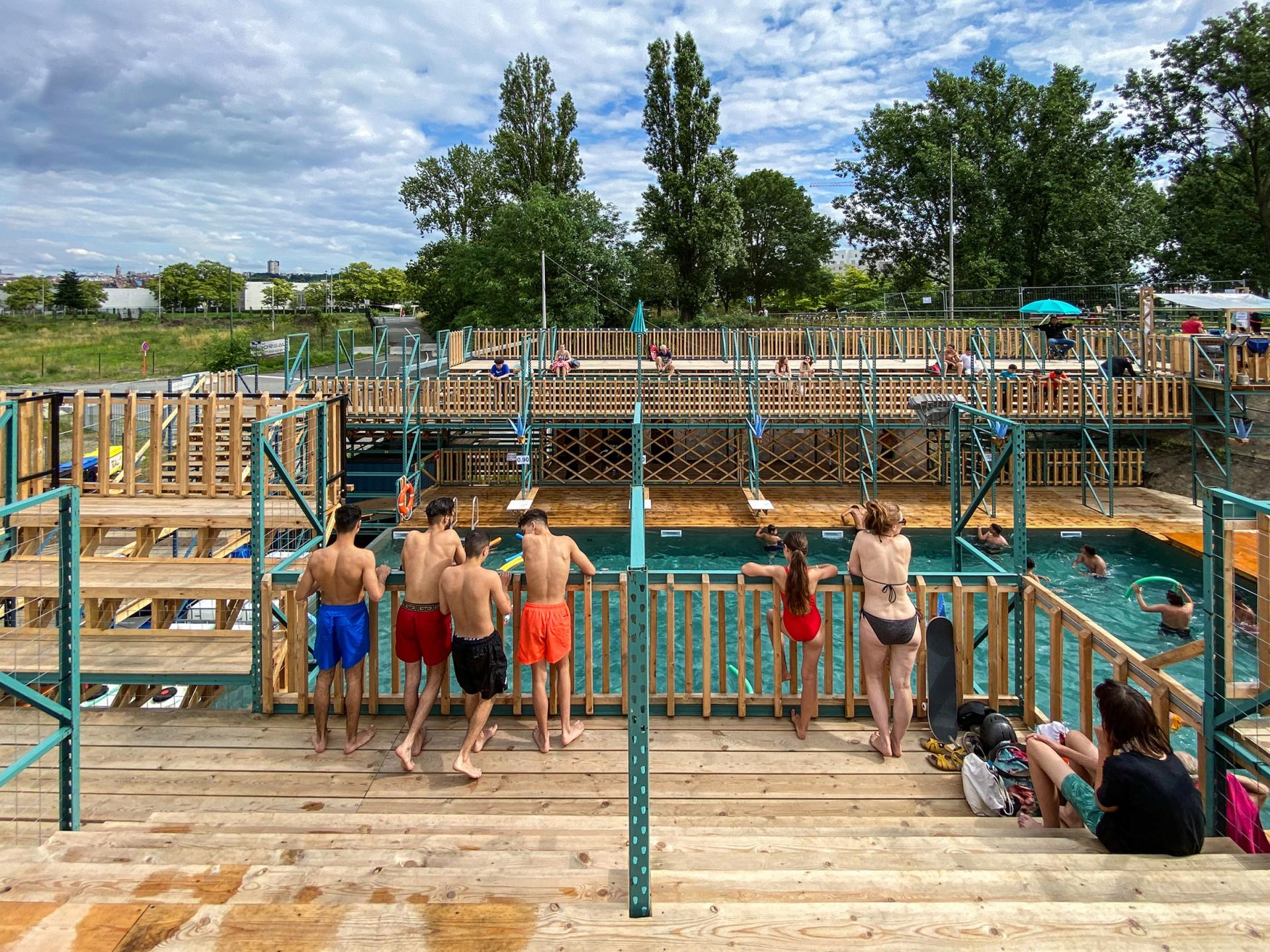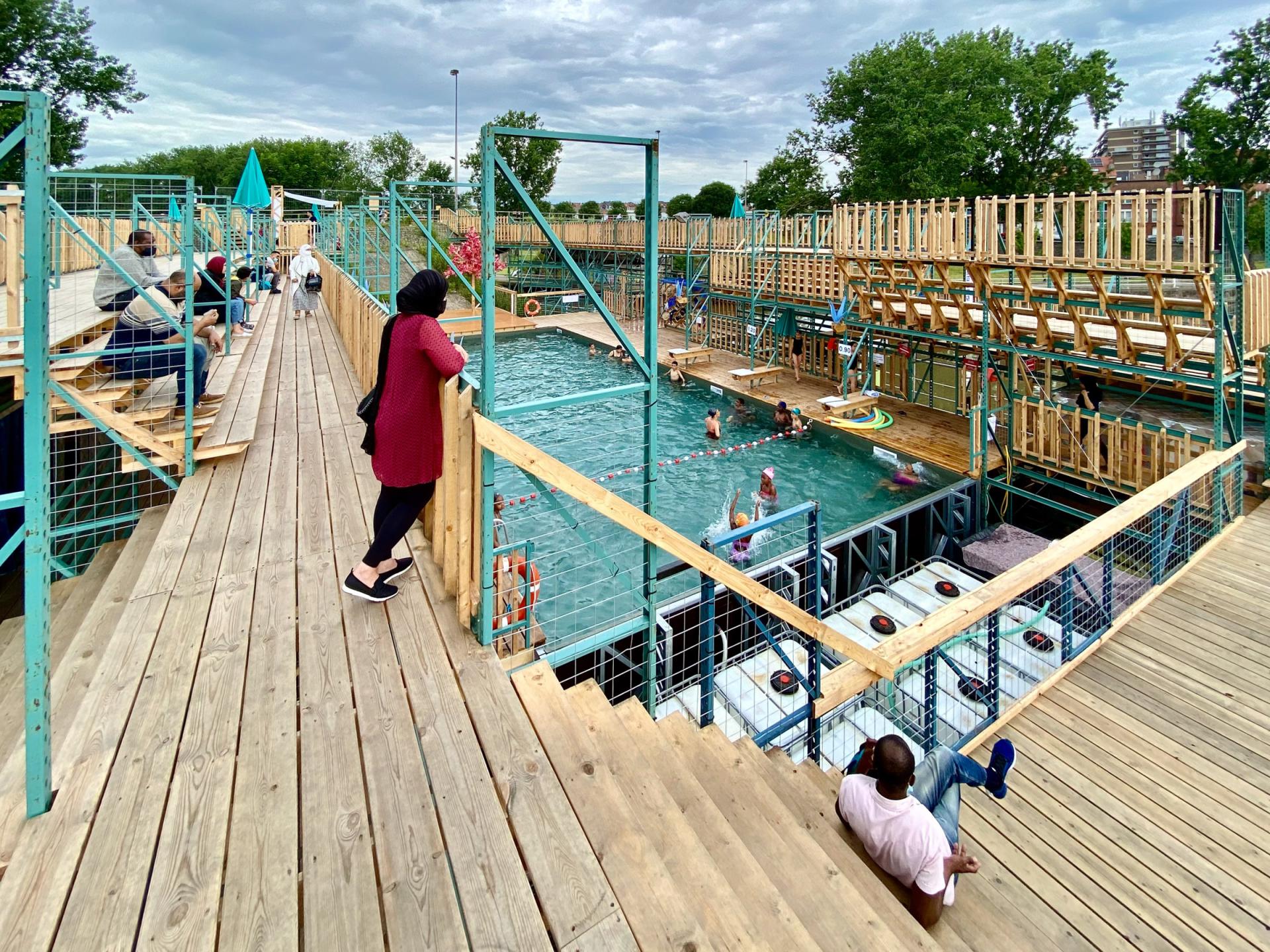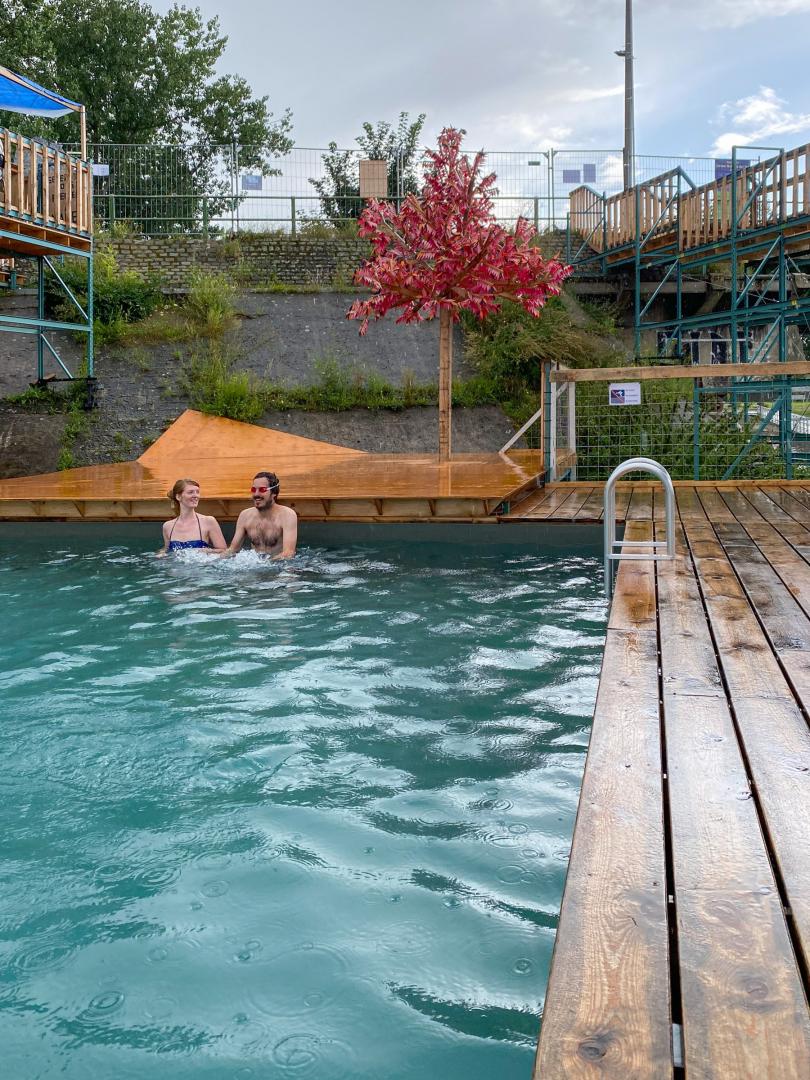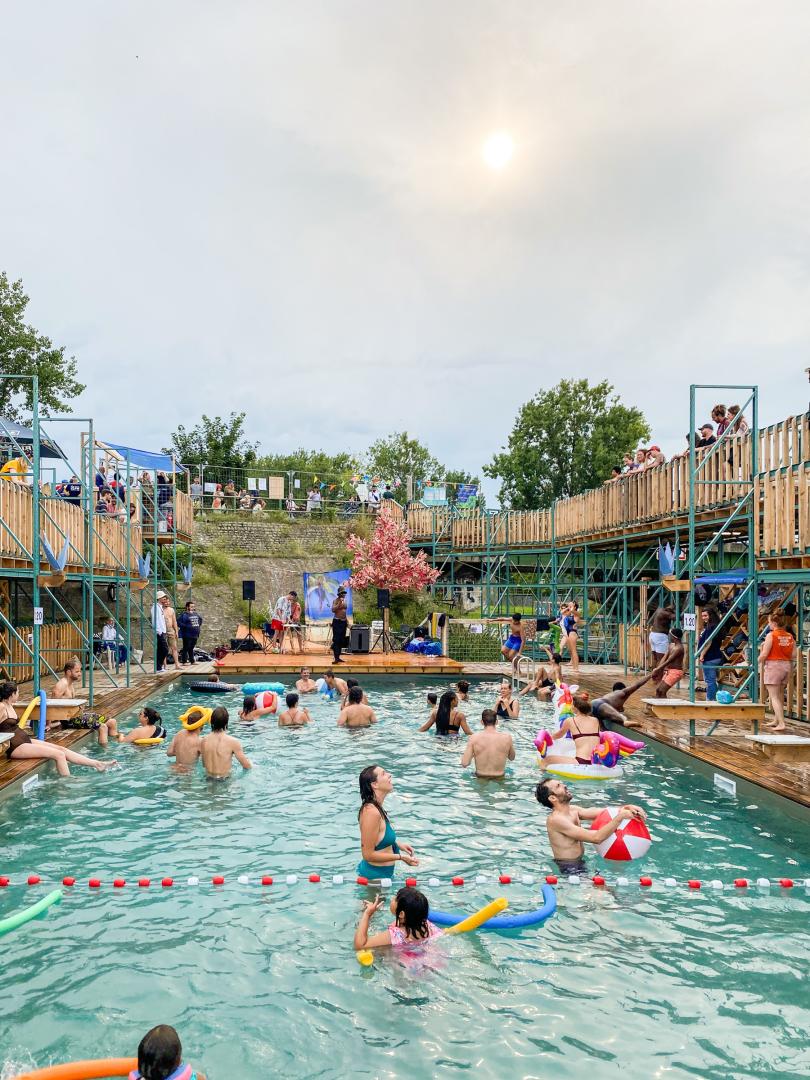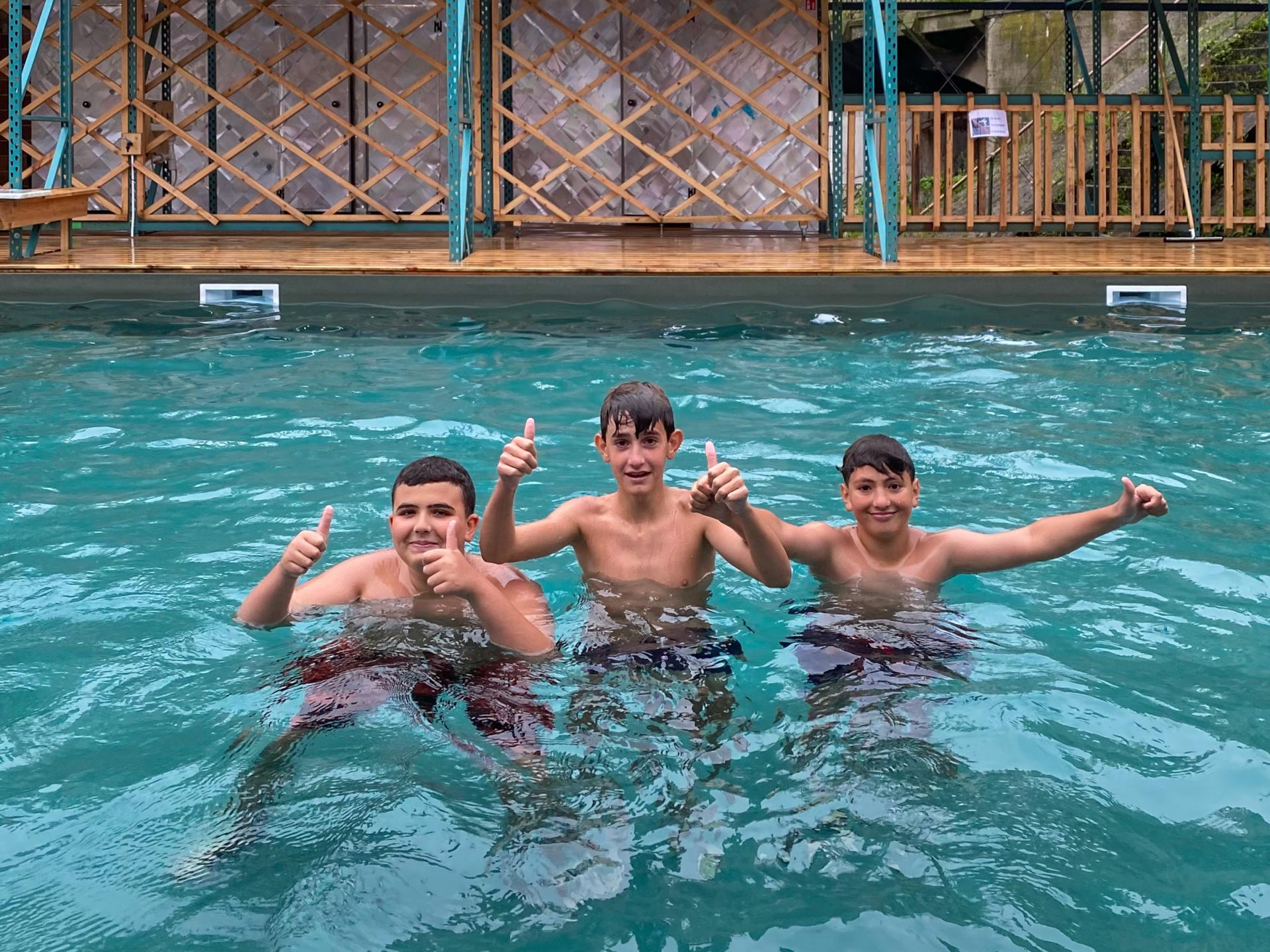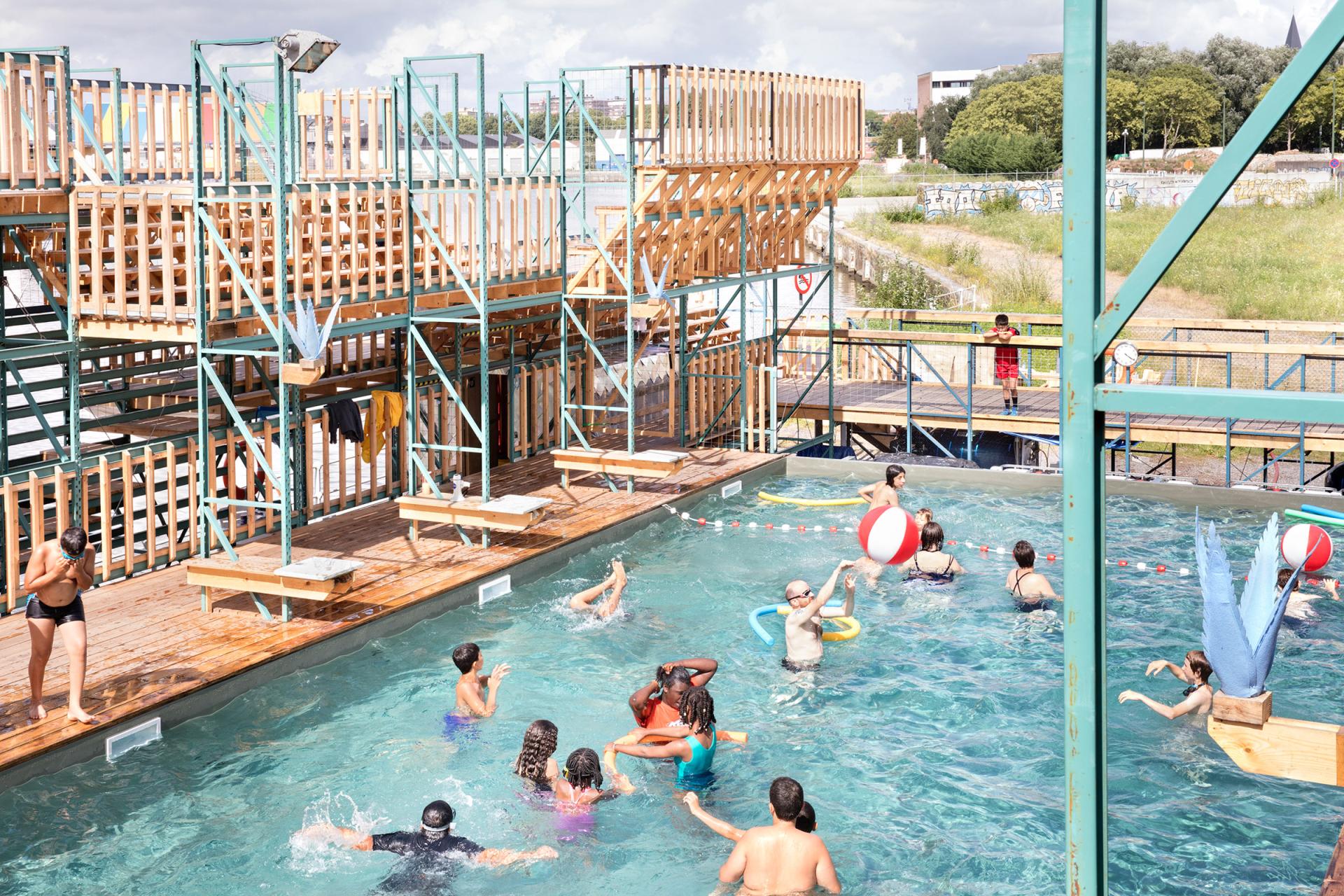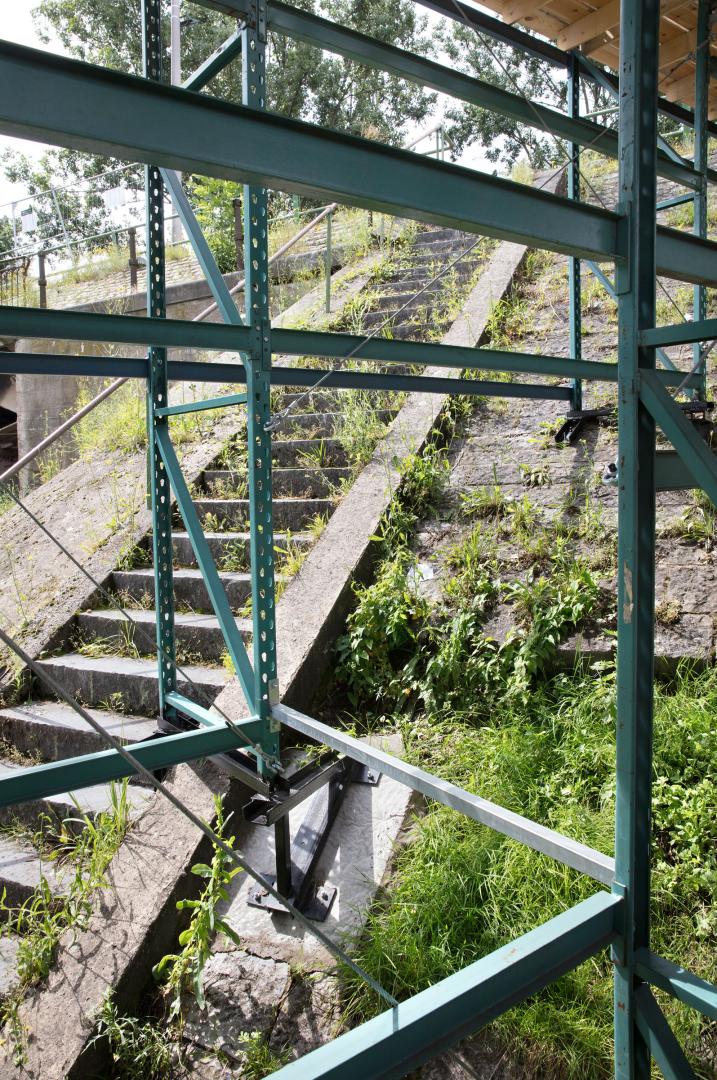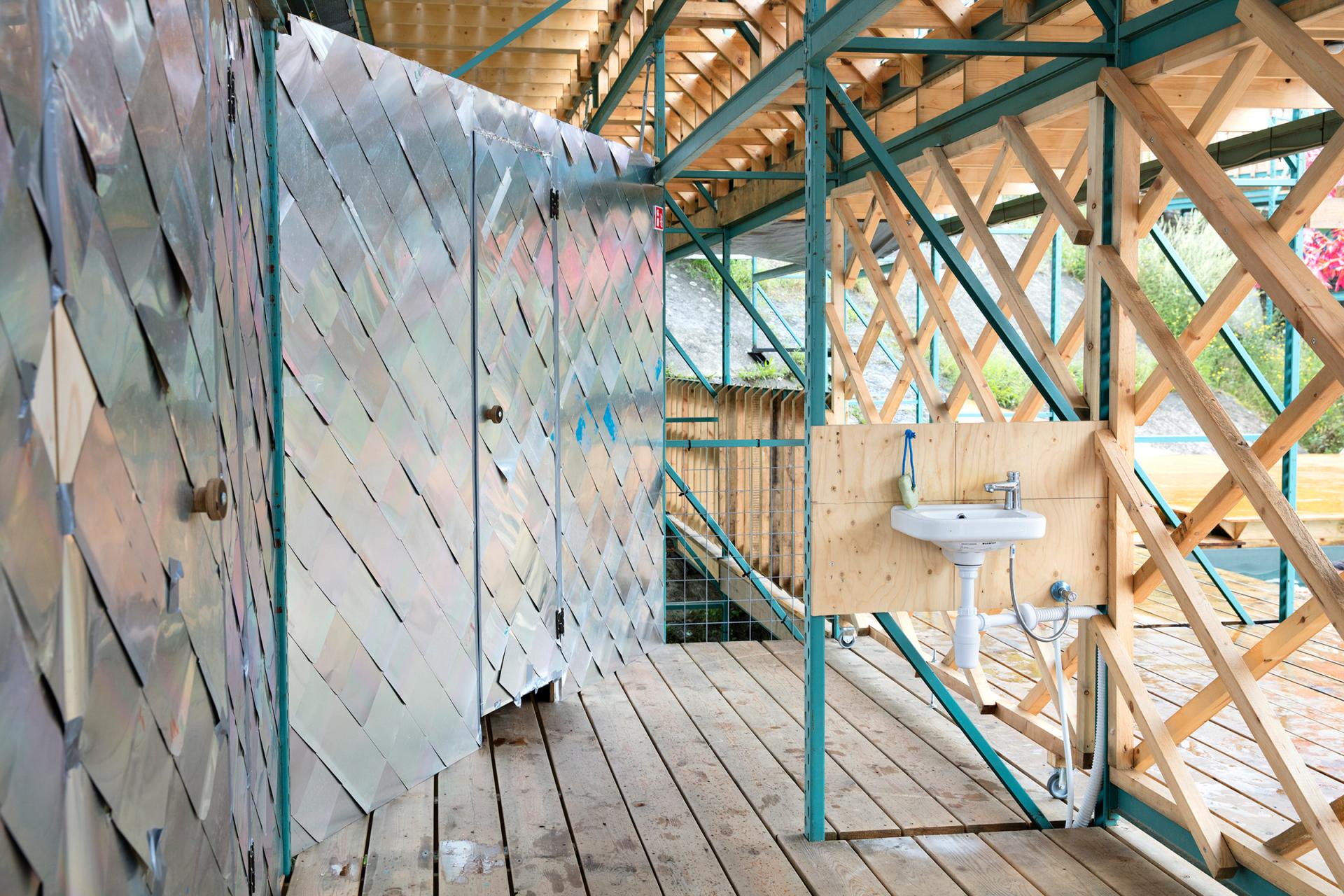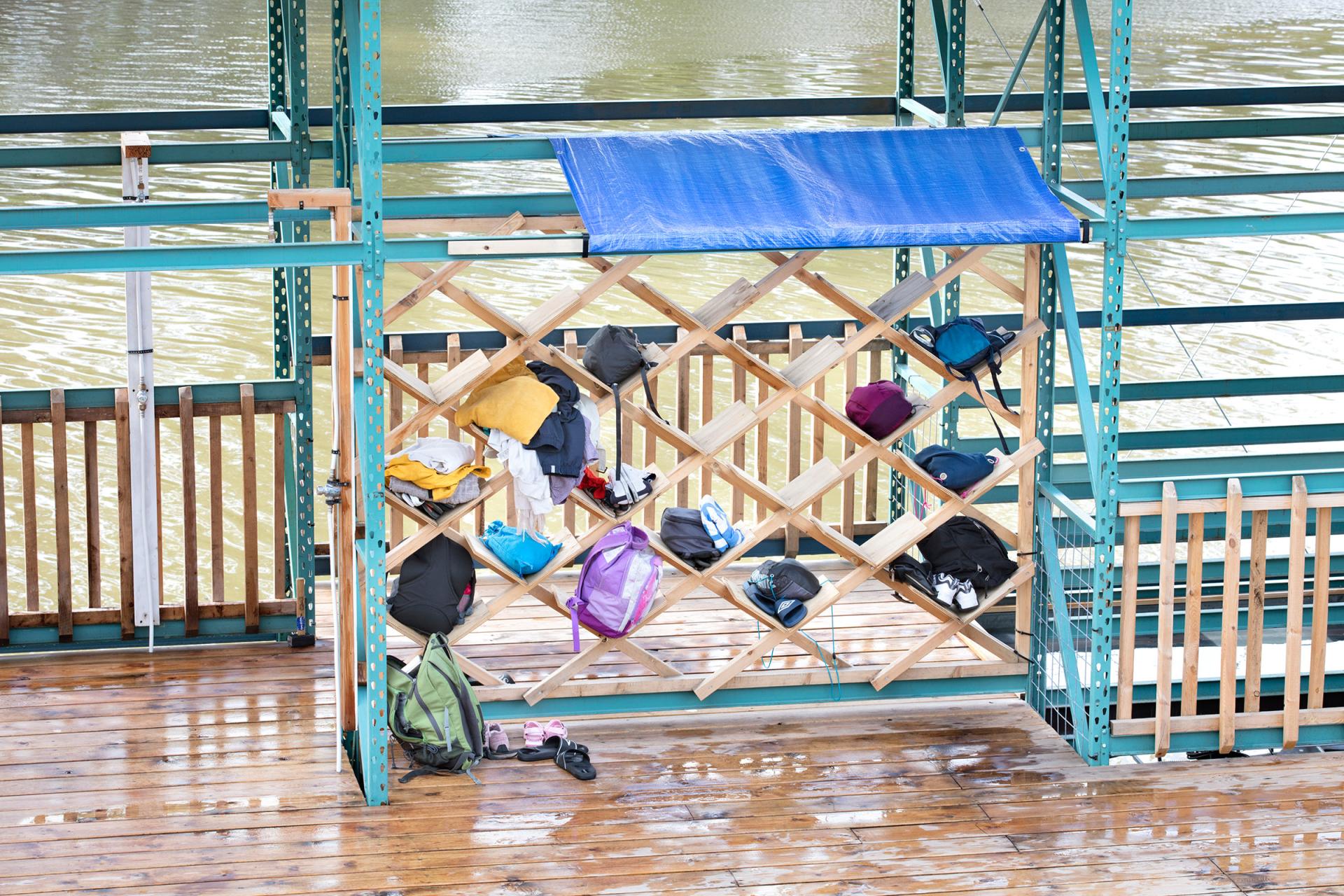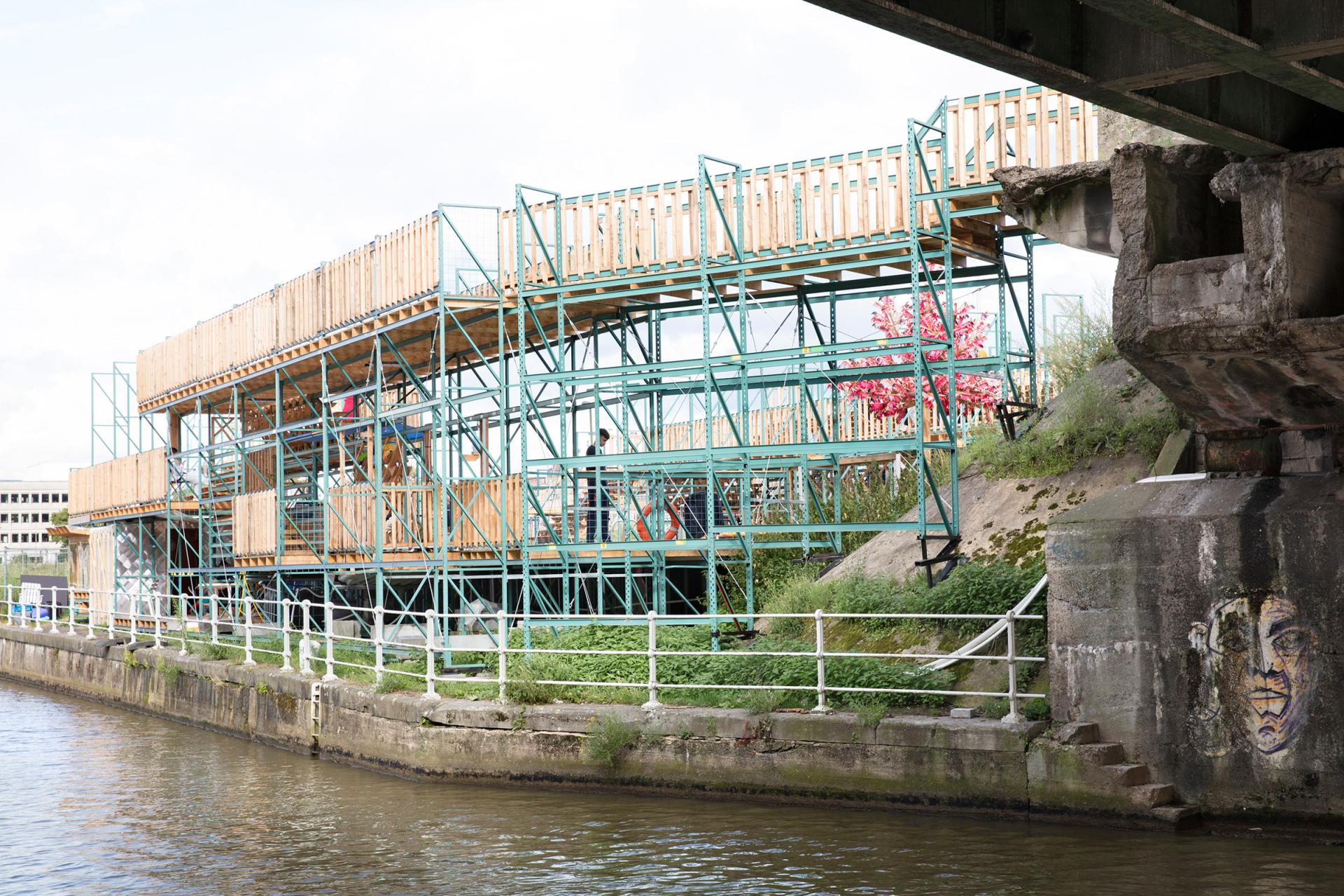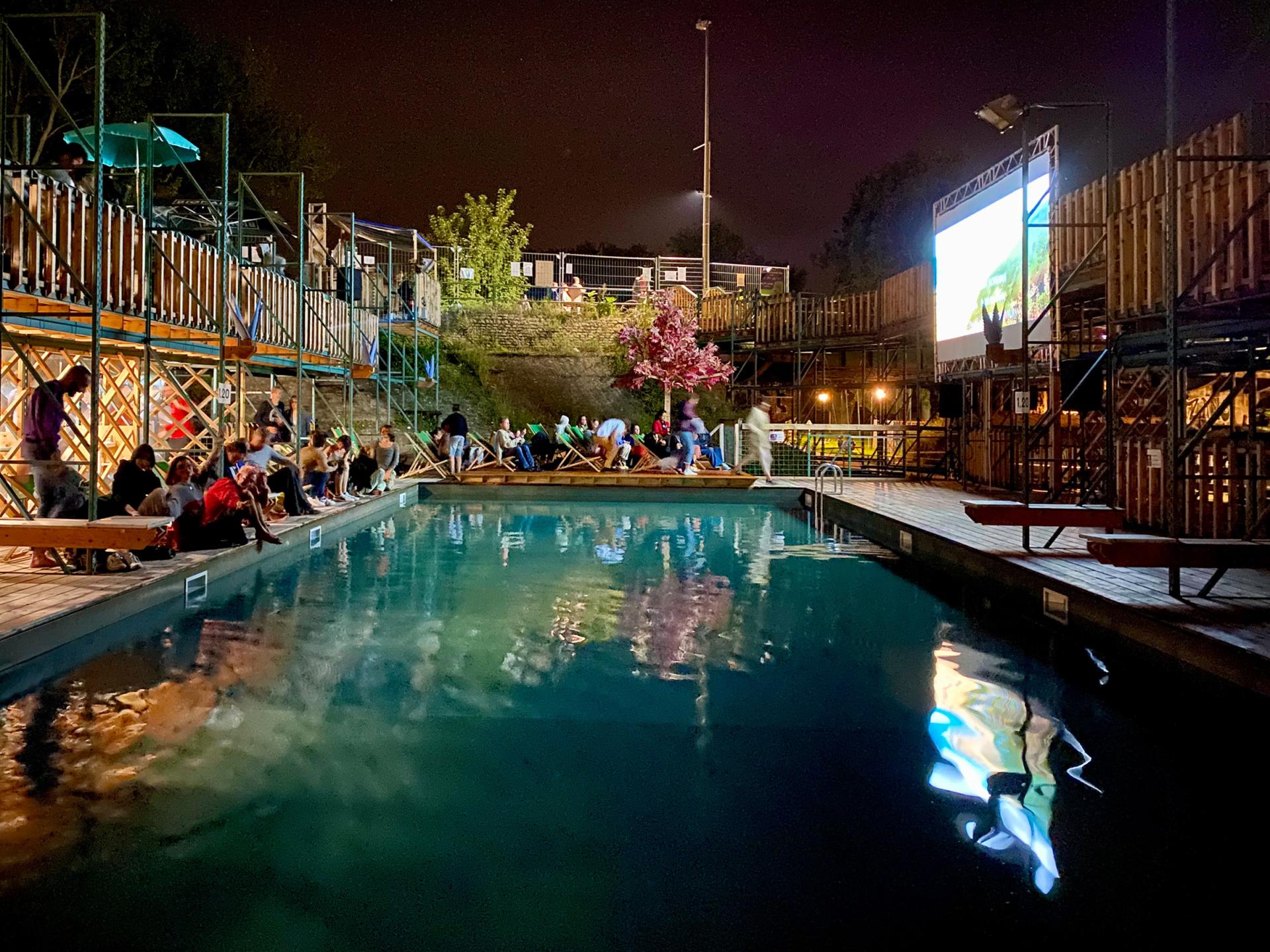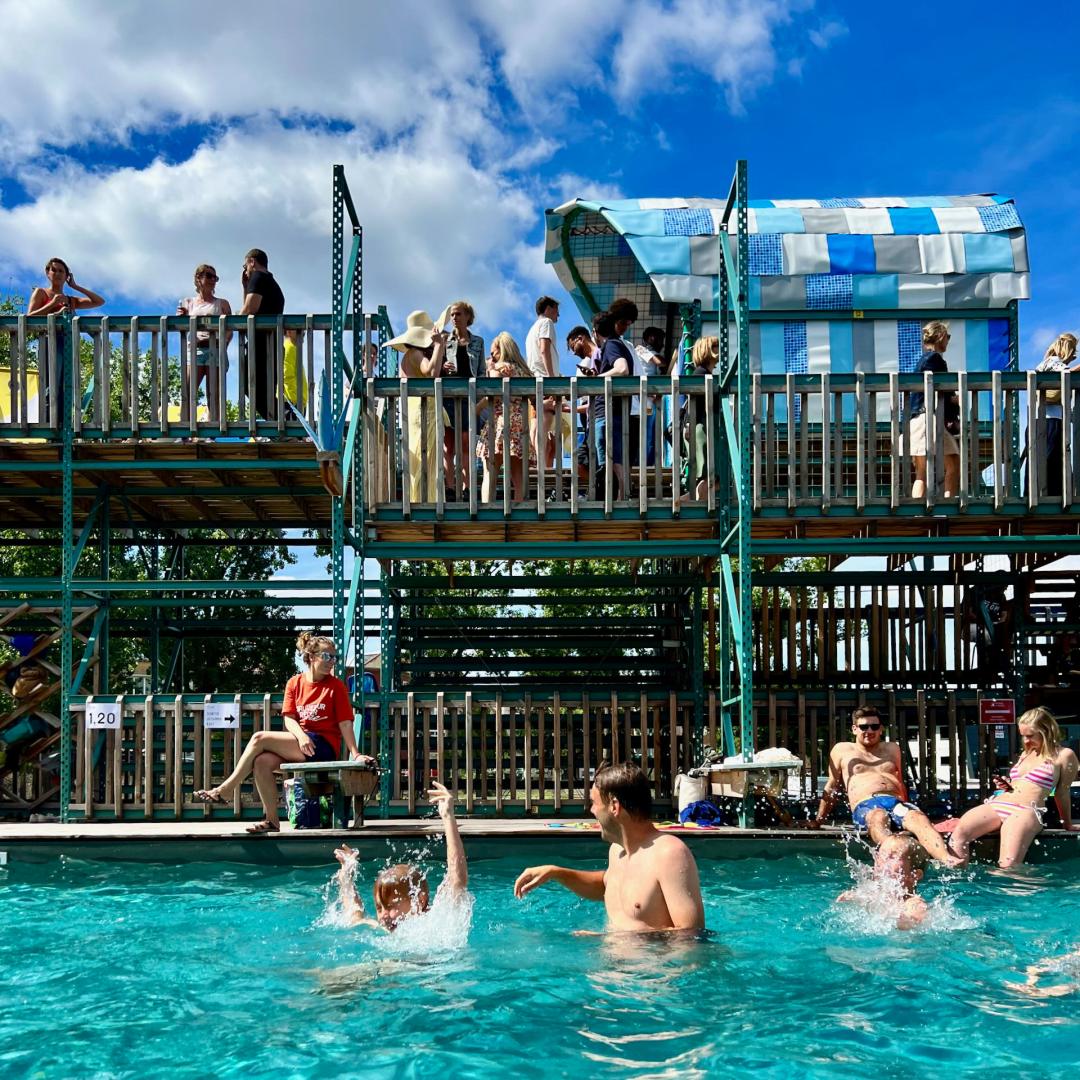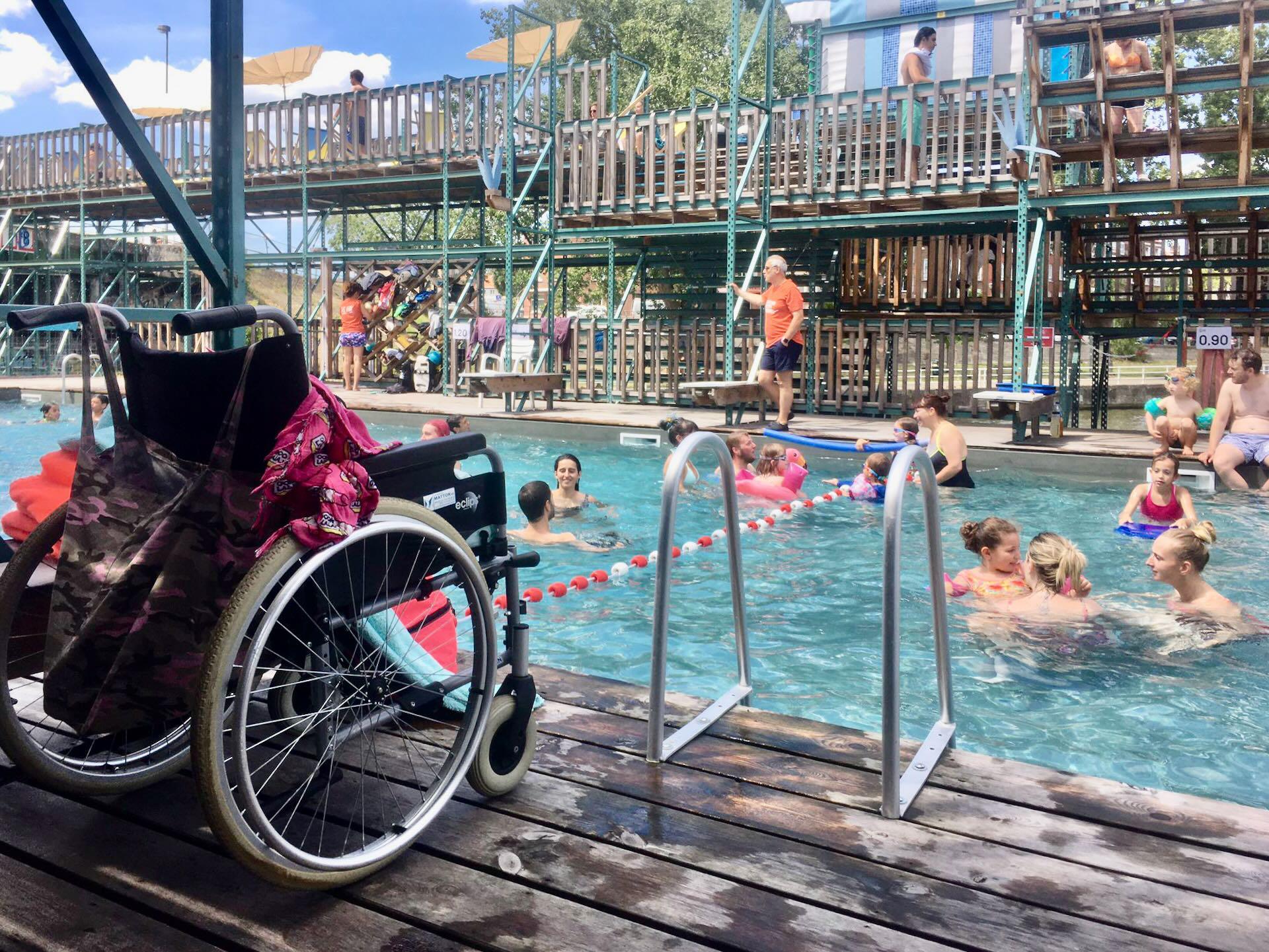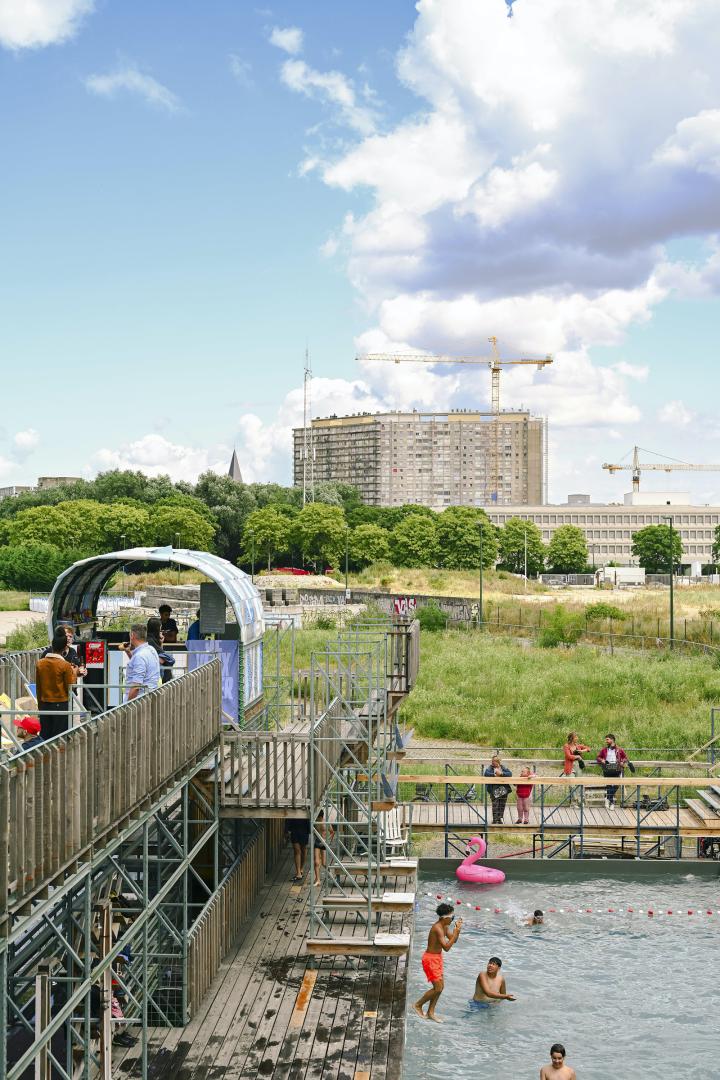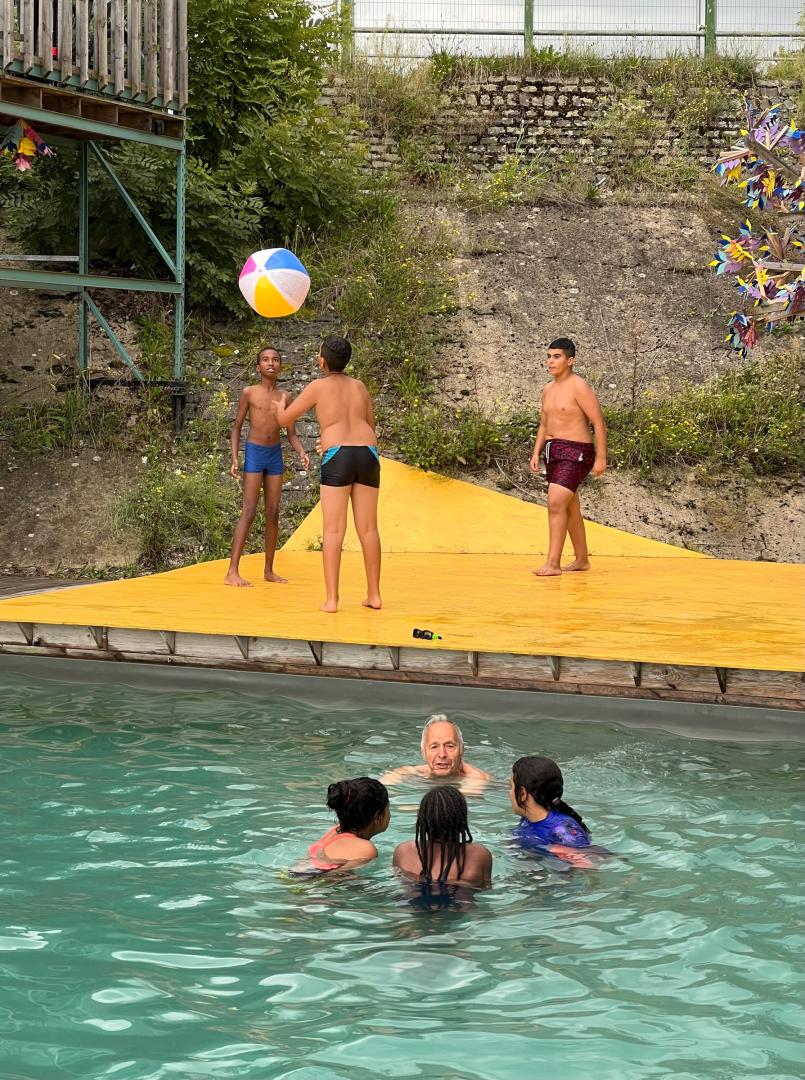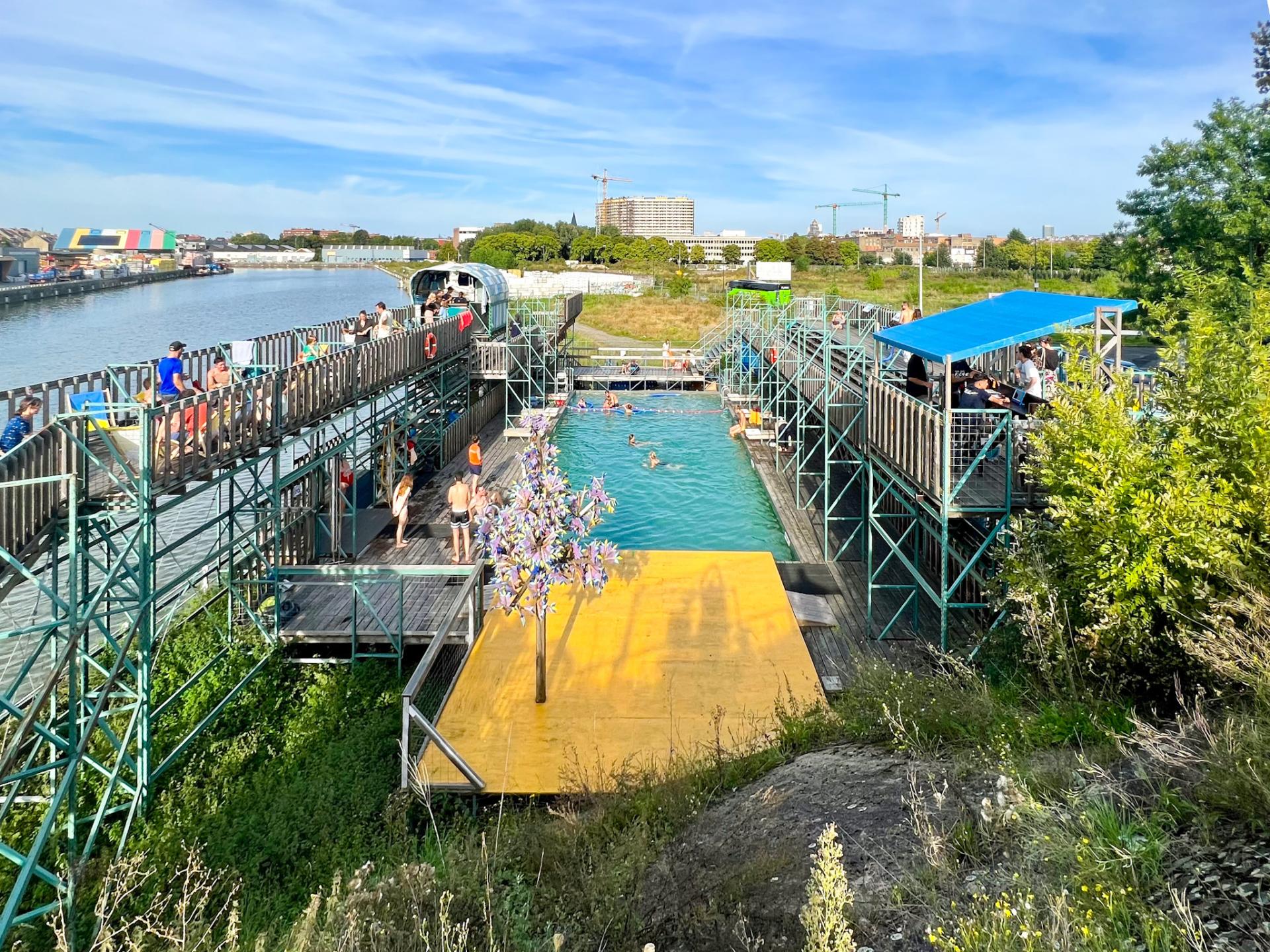FLOW
Basic information
Project Title
FLOW
Full project title
FLOW, an outdoor swimming pool as a utopian prototype for social cohesion
Category
Regaining a sense of belonging
Project Description
Brussels has had no public outdoor swimming places for the past 40 years. To inspire change, POOL IS COOL, together with Decoratelier, created a small public outdoor pool next to the Brussels canal in Anderlecht in 2021: FLOW. Reviving a derelict urban site that has been severely neglected, FLOW serves not only as a prototype of an environmentally and socially sustainable outdoor pool for the city, it is also a socio-cultural place that lives through local communities and their involvement.
Geographical Scope
Local
Project Region
Brussels Region, 1070 Anderlecht, Belgium
Urban or rural issues
Mainly urban
Physical or other transformations
It refers to a physical transformation of the built environment (hard investment)
EU Programme or fund
No
Description of the project
Summary
For decades, Brussels has not had any public infrastructure allowing people to swim outdoors. Despite discussions around this topic, nothing concrete ever happened. Advocating for the reintroduction of open-air swimming since 2015, the local non-profit organisation POOL IS COOL has taken the debate multiple steps further with public actions and temporary installations while researching the topic and calling to local authorities.
In 2021, POOL IS COOL, together with Decoratelier Jozef Wouters, created the first public outdoor swimming pool in Brussels in more than 40 years: FLOW. Measuring 17x8 metres, FLOW welcomes swimming lovers of all ages, origins, genders and social backgrounds. Situated on a derelict industrial site in Anderlecht, FLOW has provided the neighbourhood (and beyond) with a safe(r) place to enjoy a dip. Aiming to be a sustainable project, FLOW is running on green energy, and its water is being treated naturally since summer 2023.
The pool itself is surrounded by an accessible and functional scenographic infrastructure designed and built by Jozef Wouters and Decoratelier, an alliance of technicians and builders based in the vicinity of FLOW. Using their modular system made of reused metal structures and wood, and involving local youth in the construction, they made FLOW a place that can host activities under the open sky, enabling new projects and connections.
A community driven and participatory project, FLOW offers job opportunities for young people and supports local partners. FLOW reflects the diversity of Brussels itself and has become a meeting place for friends and families as well as for communities that normally have little or no contact with each other. Not only does it favour social cohesion, it also brings an urban public closer to their surroundings and nature. Demonstrating the positive impact of outdoor swimming on urban spaces and its social fabric, FLOW serves as a successful temporary prototype for long-term projects.
In 2021, POOL IS COOL, together with Decoratelier Jozef Wouters, created the first public outdoor swimming pool in Brussels in more than 40 years: FLOW. Measuring 17x8 metres, FLOW welcomes swimming lovers of all ages, origins, genders and social backgrounds. Situated on a derelict industrial site in Anderlecht, FLOW has provided the neighbourhood (and beyond) with a safe(r) place to enjoy a dip. Aiming to be a sustainable project, FLOW is running on green energy, and its water is being treated naturally since summer 2023.
The pool itself is surrounded by an accessible and functional scenographic infrastructure designed and built by Jozef Wouters and Decoratelier, an alliance of technicians and builders based in the vicinity of FLOW. Using their modular system made of reused metal structures and wood, and involving local youth in the construction, they made FLOW a place that can host activities under the open sky, enabling new projects and connections.
A community driven and participatory project, FLOW offers job opportunities for young people and supports local partners. FLOW reflects the diversity of Brussels itself and has become a meeting place for friends and families as well as for communities that normally have little or no contact with each other. Not only does it favour social cohesion, it also brings an urban public closer to their surroundings and nature. Demonstrating the positive impact of outdoor swimming on urban spaces and its social fabric, FLOW serves as a successful temporary prototype for long-term projects.
Key objectives for sustainability
The objective of POOL IS COOL was to create a prototypical outdoor swimming pool with minimal environmental and maximal social impact.
The design is based on Decoratelier’s typical grandstand system, developed for scenographies and theatrical productions. Consisting of compatible modules based on used pallet racks, it can be adapted and re-used for different projects and locations. The timber scaffolding is made to measure, keeping the steel and wood strictly separate for easy recycling. The use of repeating patterns of wooden elements facilitates learning and passing on of skills among builders of all ages. The sophistication of the design creates an attractive and aesthetic presence in the public space while being deliberately sober and averse to trends. It is not tied to any particular style or subculture and remains relevant. These qualities make FLOW a distinctive landmark, effectively unlocking the potential of a public infrastructure in a previously overlooked urban context.
Owing to a successful crowdfunding campaign and the introduction of a new legislation on the operation of swimming pools, the chemical water treatment could be replaced with a natural water filtering system in 2023, a long-desired ambition of the creators of FLOW. This new system will also allow winter swimming.
Another goal has been to run FLOW on sustainably sourced energy, which was implemented last summer. In order to save water, FLOW has been relying on the use of dry toilets from the first season, and, since 2023, the separation of liquids and solids.
Key to FLOW is the socially sustainable ambition: offering meaningful employment for inexperienced and low-educated local young people. Every season, the pool is run by a team of formidable students, who receive specific training enabling them to take on diverse responsibilities. Highly valuing co-creation and a participative approach, FLOW came to life thanks to the involvement of numerous local residents and partners.
The design is based on Decoratelier’s typical grandstand system, developed for scenographies and theatrical productions. Consisting of compatible modules based on used pallet racks, it can be adapted and re-used for different projects and locations. The timber scaffolding is made to measure, keeping the steel and wood strictly separate for easy recycling. The use of repeating patterns of wooden elements facilitates learning and passing on of skills among builders of all ages. The sophistication of the design creates an attractive and aesthetic presence in the public space while being deliberately sober and averse to trends. It is not tied to any particular style or subculture and remains relevant. These qualities make FLOW a distinctive landmark, effectively unlocking the potential of a public infrastructure in a previously overlooked urban context.
Owing to a successful crowdfunding campaign and the introduction of a new legislation on the operation of swimming pools, the chemical water treatment could be replaced with a natural water filtering system in 2023, a long-desired ambition of the creators of FLOW. This new system will also allow winter swimming.
Another goal has been to run FLOW on sustainably sourced energy, which was implemented last summer. In order to save water, FLOW has been relying on the use of dry toilets from the first season, and, since 2023, the separation of liquids and solids.
Key to FLOW is the socially sustainable ambition: offering meaningful employment for inexperienced and low-educated local young people. Every season, the pool is run by a team of formidable students, who receive specific training enabling them to take on diverse responsibilities. Highly valuing co-creation and a participative approach, FLOW came to life thanks to the involvement of numerous local residents and partners.
Key objectives for aesthetics and quality
FLOW is not the solution for the lack of outdoor swimming places in Brussels, but a functional prototype and an inspiring model created to convince authorities to invest in permanent outdoor swimming projects. Together with Decoratelier and many partners, POOL IS COOL achieved the creation of a beautiful, fun, sustainable and inclusive experience for Brussel’s citizens, who were thus far deprived of the possibility to cool down in summer. FLOW offers them a platform to meet and enjoy themselves, providing them with a number of sporty, recreational and cultural activities to take part in.
FLOW, despite being an exceptional visual landmark, melts into its environment characterised by the adjoining Pierre Marchant bridge and the canal. The modular grandstand structure developed by Decoratelier can fit different contexts and programs through its flexible and adaptable design. It marries aesthetics and practicality, earning a nomination for the Henry Van de Velde design award in 2021 and the Mies Van de Rohe Awards 2024 as well as a feature in a publication by the Flemish Architecture Institute in 2022. While offering functional amenities such as changing rooms, a ramp for wheelchairs, toilets and showers, FLOW is above all a place for relaxation, leisure and joy. Noteworthy are the multi-tiered sun decks, offering a vast space to enjoy a nap or a snack from the kiosk, or to host cultural events. Local artists' decorative touches infuse the place with a dreamlike ambiance.
FLOW offers a unique aquatic experience and more for young and old, while providing a safe(r) and positive space for all. Visitors benefit from a diverse programmation of sportive and cultural activities: swimming lessons for adults and kids, aquagym, yoga, dance, literature, poetry, music… There have been repeated calls to extend the FLOW experience to the winter months with a sauna and winter swimming. Unfortunately this has not yet been realised due to a lack of financial resources.
FLOW, despite being an exceptional visual landmark, melts into its environment characterised by the adjoining Pierre Marchant bridge and the canal. The modular grandstand structure developed by Decoratelier can fit different contexts and programs through its flexible and adaptable design. It marries aesthetics and practicality, earning a nomination for the Henry Van de Velde design award in 2021 and the Mies Van de Rohe Awards 2024 as well as a feature in a publication by the Flemish Architecture Institute in 2022. While offering functional amenities such as changing rooms, a ramp for wheelchairs, toilets and showers, FLOW is above all a place for relaxation, leisure and joy. Noteworthy are the multi-tiered sun decks, offering a vast space to enjoy a nap or a snack from the kiosk, or to host cultural events. Local artists' decorative touches infuse the place with a dreamlike ambiance.
FLOW offers a unique aquatic experience and more for young and old, while providing a safe(r) and positive space for all. Visitors benefit from a diverse programmation of sportive and cultural activities: swimming lessons for adults and kids, aquagym, yoga, dance, literature, poetry, music… There have been repeated calls to extend the FLOW experience to the winter months with a sauna and winter swimming. Unfortunately this has not yet been realised due to a lack of financial resources.
Key objectives for inclusion
Inclusion is a cornerstone of FLOW's organisation and operation. Engaging local youth in its construction and daily operation, and involving local partners in the fields of design, construction, engineering and team management have been pivotal in making FLOW a thriving, inclusive public space for people from all walks of life across the city.
POOL IS COOL is committed to ensure that every individual, regardless of identity, background, ability, gender, ethnicity, religion, or age, feels welcome at FLOW. The pool is frequented by many marginalised groups of people, such as racialised or queer communities.Well-defined codes of conduct enforced by a diverse team were introduced to create a safe(r) and respectful environment for everyone. An example would be the swimming slots for women only, which provide a secure space for, among others, many female Muslim community members to enjoy swimming free from undesired gazes.
Recognising that everyone should have access to FLOW without financial strain, POOL IS COOL implemented an adapted price strategy. Thanks to the financial support from local governmental institutions and other organisations, access to FLOW, if booked on the spot, is free for everyone. Equipment like toys, swimsuits, burkinis, and towels are available for every person to use, guaranteeing a fully enjoyable experience for entire families as well as for swimmers who forgot to bring their swimwear. Online reservation fees were introduced to counter no-shows: prices range from 1€ to 3€, a free contribution can be made to support the project.
Additionally, POOL IS COOL offers a wide range of activities at FLOW that suit virtually every taste. From cultural performances and concerts, movie nights, and qi-gong classes to free swimming lessons and reading sessions for children, the aim is to cater to diverse interests, make everyone feel at ease and foster a sense of belonging.
POOL IS COOL is committed to ensure that every individual, regardless of identity, background, ability, gender, ethnicity, religion, or age, feels welcome at FLOW. The pool is frequented by many marginalised groups of people, such as racialised or queer communities.Well-defined codes of conduct enforced by a diverse team were introduced to create a safe(r) and respectful environment for everyone. An example would be the swimming slots for women only, which provide a secure space for, among others, many female Muslim community members to enjoy swimming free from undesired gazes.
Recognising that everyone should have access to FLOW without financial strain, POOL IS COOL implemented an adapted price strategy. Thanks to the financial support from local governmental institutions and other organisations, access to FLOW, if booked on the spot, is free for everyone. Equipment like toys, swimsuits, burkinis, and towels are available for every person to use, guaranteeing a fully enjoyable experience for entire families as well as for swimmers who forgot to bring their swimwear. Online reservation fees were introduced to counter no-shows: prices range from 1€ to 3€, a free contribution can be made to support the project.
Additionally, POOL IS COOL offers a wide range of activities at FLOW that suit virtually every taste. From cultural performances and concerts, movie nights, and qi-gong classes to free swimming lessons and reading sessions for children, the aim is to cater to diverse interests, make everyone feel at ease and foster a sense of belonging.
Results in relation to category
In the past 3 years FLOW has welcomed almost 40.000 swimmers, joined by participants of events and activities. Hosting over 50 cultural events and as many free swimming lessons together with up to 5 weekly sportive activities during the past 3 seasons, FLOW connects people by providing opportunities for new and shared experiences. The design-for-all infrastructure encourages relaxation, socialising, and the forming of lasting bonds between guests, cultural actors and staff (40 people per season). FLOW's commitment to inclusivity ensures that individuals from all backgrounds feel valued and welcome. Discrimination is deliberately addressed to make FLOW a safe(r) and respectful environment also for marginalised groups.
FLOW has added a special quality to an overlooked urban space, reigniting a profound sense of belonging among the local communities with a lasting positive impact on their social fabric. The participative approach transformed it from an urban project into a shared endeavour. Local youth were essential for both the construction and daily operation of the pool, instilling a strong sense of ownership and purpose.
With an average occupancy rate of 65% despite rainy days, FLOW not only met but exceeded expectations. Due to its limited size, FLOW cannot cater to the excess demand during sunny days. FLOW is not the ultimate solution to the outdoor swimming shortage in Brussels—it serves as a powerful demonstration of what is feasible and what is needed by the public.
Now a landmark in Brussels and a social anchor in the neighbourhood of Anderlecht, FLOW gained positive attention from media and governing bodies. Among others, it inspired outdoor swimming projects such as the planned rooftop pool on the Abattoir site in Anderlecht. FLOW's success and recognition as a finalist for the European Prize for Urban Public Space 2022, along with enthusiastic community support, illustrates the sustainable impact and replicable potential of the project.
FLOW has added a special quality to an overlooked urban space, reigniting a profound sense of belonging among the local communities with a lasting positive impact on their social fabric. The participative approach transformed it from an urban project into a shared endeavour. Local youth were essential for both the construction and daily operation of the pool, instilling a strong sense of ownership and purpose.
With an average occupancy rate of 65% despite rainy days, FLOW not only met but exceeded expectations. Due to its limited size, FLOW cannot cater to the excess demand during sunny days. FLOW is not the ultimate solution to the outdoor swimming shortage in Brussels—it serves as a powerful demonstration of what is feasible and what is needed by the public.
Now a landmark in Brussels and a social anchor in the neighbourhood of Anderlecht, FLOW gained positive attention from media and governing bodies. Among others, it inspired outdoor swimming projects such as the planned rooftop pool on the Abattoir site in Anderlecht. FLOW's success and recognition as a finalist for the European Prize for Urban Public Space 2022, along with enthusiastic community support, illustrates the sustainable impact and replicable potential of the project.
How Citizens benefit
Decoratelier approached the construction as a collaborative endeavour, offering education and temporary employment opportunities to more than 50 low-educated and potentially vulnerable local youths from a neighbourhood where unemployment is a pressing concern. These young individuals not only contributed their physical and technical abilities but also shared their perspectives with FLOW. Throughout and after the construction process, meaningful discussions unfolded about topics such as public space, police conduct, inclusion and discrimination. Including them in the discussions and giving their opinions weight gave them a sense of belonging and purpose.
In 2020, crowded Belgian beaches and COVID restrictions led to tensions with young people from Brussels, an issue that occurred in other parts of Belgium in subsequent years. Instead of addressing underlying problems like the lack of recreational spaces, some groups were unfairly stigmatised and even barred from swimming areas by local authorities. Such issues are being addressed at FLOW, a place where some of these very same individuals helped in constructing an open and inclusive swimming spot in their own city.
The ongoing engagement of local youth in the day-to-day operation and maintenance of the pool have been vital in fostering a sense of collective ownership. This has allowed FLOW to continue serving as a sanctuary for groups and individuals from the vicinity, while also attracting a wonderfully diverse audience from across Brussels. The pool demonstrates how public swimming spaces can mitigate social disparities and empower the social fabric within an urban setting through inclusion, thus strengthening the sense of belonging. It also exemplifies how well designed urban public spaces can be unifying rather than contributing to gentrification if approached with openness and care for the distinct characteristics of the place and its people.
In 2020, crowded Belgian beaches and COVID restrictions led to tensions with young people from Brussels, an issue that occurred in other parts of Belgium in subsequent years. Instead of addressing underlying problems like the lack of recreational spaces, some groups were unfairly stigmatised and even barred from swimming areas by local authorities. Such issues are being addressed at FLOW, a place where some of these very same individuals helped in constructing an open and inclusive swimming spot in their own city.
The ongoing engagement of local youth in the day-to-day operation and maintenance of the pool have been vital in fostering a sense of collective ownership. This has allowed FLOW to continue serving as a sanctuary for groups and individuals from the vicinity, while also attracting a wonderfully diverse audience from across Brussels. The pool demonstrates how public swimming spaces can mitigate social disparities and empower the social fabric within an urban setting through inclusion, thus strengthening the sense of belonging. It also exemplifies how well designed urban public spaces can be unifying rather than contributing to gentrification if approached with openness and care for the distinct characteristics of the place and its people.
Physical or other transformations
It refers to a physical transformation of the built environment (hard investment)
Innovative character
FLOW is more than a swimming pool—it represents an innovative, forward-thinking approach to urban planning and a testament to the potential for positive change in urban spaces. So far the only public outdoor pool in Brussels, FLOW is unique in several aspects. Whereas outdoor swimming facilities are commonplace in other European cities, FLOW emerged as a response to the absence of such amenities in the Belgian capital. It represents a joint effort to reintroduce the tradition of outdoor swimming to Brussels’ citizens. FLOW's success challenges the notion that Belgium's climate isn't conducive to outdoor swimming, proving that a well-designed facility meets a genuine demand.
The transformation of a neglected urban area into an attractive, lively and functional public space made for all is one of FLOW's key achievements. The architecture of FLOW, characterised by its innovative replicable design by Decoratelier, together with its participative approach involving a variety of partners, serves as a worthy model for future urban projects.
FLOW also serves as a catalyst for social cohesion, fostering ties within the local community while providing a unique space for co-creation, exchanges and cultural innovation. The pool's emphasis on inclusivity, seamlessly integrating aesthetics and functionality while highlighting the importance of the surrounding social fabric, underscores its commitment to provide a design that fits all. At FLOW, the shared ownership model is not just theory—it is a tangible reality. With demonstrable effects on both the urban landscape and political dialogue, FLOW symbolises progress and plays a significant role in propelling social transformation within the city.
In addition to its social impact, FLOW also leads the way in sustainable water treatment practices. By employing natural water treatment, the pool sets a new standard for aquatic facilities in Brussels, showcasing a commitment to environmentally responsible urban development.
The transformation of a neglected urban area into an attractive, lively and functional public space made for all is one of FLOW's key achievements. The architecture of FLOW, characterised by its innovative replicable design by Decoratelier, together with its participative approach involving a variety of partners, serves as a worthy model for future urban projects.
FLOW also serves as a catalyst for social cohesion, fostering ties within the local community while providing a unique space for co-creation, exchanges and cultural innovation. The pool's emphasis on inclusivity, seamlessly integrating aesthetics and functionality while highlighting the importance of the surrounding social fabric, underscores its commitment to provide a design that fits all. At FLOW, the shared ownership model is not just theory—it is a tangible reality. With demonstrable effects on both the urban landscape and political dialogue, FLOW symbolises progress and plays a significant role in propelling social transformation within the city.
In addition to its social impact, FLOW also leads the way in sustainable water treatment practices. By employing natural water treatment, the pool sets a new standard for aquatic facilities in Brussels, showcasing a commitment to environmentally responsible urban development.
Disciplines/knowledge reflected
The design and implementation of FLOW posed a set of distinct challenges and required the active involvement of a range of experts from different fields, not to mention the many volunteers. POOL IS COOL and Decoratelier collaborated with local, national and international partners specialised in areas such as architecture, engineering, urbanism, social work, communication, and culture. The combined expertise of these partners formed a robust foundation for the project's success and its sustainable reach. Effective transparent communication and seamless cooperation were central to overcome the multifaceted challenges related to design, construction, sustainability, accessibility and more. This necessitated a departure from conventional methods towards a problem-solving approach, fostering an environment for creative and innovative out-of-the-box solutions.
While POOL IS COOL initially aimed to mainly advocate for the reintroduction of public open-air swimming in Brussels, the overwhelming support from the city's residents, galvanised through POOL IS COOL’s public actions and social media outreach, paved the way for the realisation of this groundbreaking pilot project.
The endorsement from local authorities and public institutions has also deepened POOL IS COOL's engagement with various public representatives. Many of them have not only witnessed and acknowledged the environmental, social and cultural benefits of FLOW, but have also become more receptive to the idea of implementing more permanent solutions in future revitalisation projects across the canal site and elsewhere in Brussels. As a result, a number of organisations and public agents have reached out to POOL IS COOL to help with the development and implementation of a number of concrete outdoor swimming projects.
While POOL IS COOL initially aimed to mainly advocate for the reintroduction of public open-air swimming in Brussels, the overwhelming support from the city's residents, galvanised through POOL IS COOL’s public actions and social media outreach, paved the way for the realisation of this groundbreaking pilot project.
The endorsement from local authorities and public institutions has also deepened POOL IS COOL's engagement with various public representatives. Many of them have not only witnessed and acknowledged the environmental, social and cultural benefits of FLOW, but have also become more receptive to the idea of implementing more permanent solutions in future revitalisation projects across the canal site and elsewhere in Brussels. As a result, a number of organisations and public agents have reached out to POOL IS COOL to help with the development and implementation of a number of concrete outdoor swimming projects.
Methodology used
POOL IS COOL aims to bring about change by conveying a positive message about opportunities rather than complaining about what is missing. While the methodology of POOL IS COOL consists mainly of research, lobbying and the organisation of small public actions to bring the outdoor pool into the public spotlight, the creation of FLOW had to rely on a much more strategic approach in order to be feasible.
Realising that lobbying was not enough to generate concrete action top-down, POOL IS COOL decided to take matters into their own hands and build and operate the first outdoor swimming place in Brussels. Previous experiences, research findings and contacts were indispensable to receive the necessary funds and permissions. It was clear that the success of the project would be dependent on an extended network of partners. Following a call of interest, Decoratelier was chosen from a pool of candidates to design and construct the pool's infrastructure together with POOL IS COOL.
The creation of FLOW and its transformation are characterised by a continuous bottom-up, community-focused, participatory approach. It is driven by user feedback and involves local partners and residents, especially young people, in both the construction and ongoing operation of the pool. This inclusive strategy aims to create a strong sense of ownership and belonging among community members. POOL IS COOL has worked closely with various partners from the non-profit sector, as well as public stakeholders, to maximise the social, cultural and environmental impact of FLOW. The collaboration ensures that FLOW not only serves as a recreational space, but also continues to address wider social and environmental concerns.
This inclusive approach proved to be successful in every aspect of setting up, building and managing the pool and can certainly be appropriated for other projects in other contexts, be they related to water or not.
Realising that lobbying was not enough to generate concrete action top-down, POOL IS COOL decided to take matters into their own hands and build and operate the first outdoor swimming place in Brussels. Previous experiences, research findings and contacts were indispensable to receive the necessary funds and permissions. It was clear that the success of the project would be dependent on an extended network of partners. Following a call of interest, Decoratelier was chosen from a pool of candidates to design and construct the pool's infrastructure together with POOL IS COOL.
The creation of FLOW and its transformation are characterised by a continuous bottom-up, community-focused, participatory approach. It is driven by user feedback and involves local partners and residents, especially young people, in both the construction and ongoing operation of the pool. This inclusive strategy aims to create a strong sense of ownership and belonging among community members. POOL IS COOL has worked closely with various partners from the non-profit sector, as well as public stakeholders, to maximise the social, cultural and environmental impact of FLOW. The collaboration ensures that FLOW not only serves as a recreational space, but also continues to address wider social and environmental concerns.
This inclusive approach proved to be successful in every aspect of setting up, building and managing the pool and can certainly be appropriated for other projects in other contexts, be they related to water or not.
How stakeholders are engaged
FLOW would not have been possible without the widespread support from stakeholders at various levels. The knowledge and expertise of each partner within their respective field proved to be vital for the project’s realisation, daily operations and overall success.
Responsible for the design and construction of FLOW, Decoratelier collaborated with FIX, a non-profit organisation employing low-educated locals, for building FLOW. Thanks to ART2WORK’s local network, FLOW is operated by young people from the district, making FLOW ‘their’ place anchored in the neighbourhood. The collaboration with Polyplan and Ecoworks was essential for the development of the pool and the natural filtering system.
FLOW’s diverse agenda is enriched by Brussels-based cultural organisations like Kunstenfestivaldesarts, Zinnema, Cinema Galeries, CIFAS, Nadine and many more, offering a program by and for international participants and audiences. These activities, integral to the pool's public role, bring together diverse artistic and social communities, enabling a culturally rich activation of the pool.
The complexity of constructing a public open-air swimming pool is mirrored in the support received from local and regional public institutions, including the Brussels Government, the Flemish Government and Flemish Community Commission, Brussels Environment, Brussels Mobility, Urban.brussels, the Port of Brussels, the Commune of Anderlecht and various sponsors.
The initial ambition of POOL IS COOL to implement natural water treatment, already possible for a long time elsewhere in Europe, led to the adaptation of the Brussels legislation regarding the operation of swimming pools by the Government of the Brussels Capital Region.
FLOW also relied on a crowdfunding campaign led by the local non-profit Growfunding, extending the ownership to the citizens of Brussels. All of these stakeholders saw their own aspirations reflected in FLOW and continue to offer support where possible.
Responsible for the design and construction of FLOW, Decoratelier collaborated with FIX, a non-profit organisation employing low-educated locals, for building FLOW. Thanks to ART2WORK’s local network, FLOW is operated by young people from the district, making FLOW ‘their’ place anchored in the neighbourhood. The collaboration with Polyplan and Ecoworks was essential for the development of the pool and the natural filtering system.
FLOW’s diverse agenda is enriched by Brussels-based cultural organisations like Kunstenfestivaldesarts, Zinnema, Cinema Galeries, CIFAS, Nadine and many more, offering a program by and for international participants and audiences. These activities, integral to the pool's public role, bring together diverse artistic and social communities, enabling a culturally rich activation of the pool.
The complexity of constructing a public open-air swimming pool is mirrored in the support received from local and regional public institutions, including the Brussels Government, the Flemish Government and Flemish Community Commission, Brussels Environment, Brussels Mobility, Urban.brussels, the Port of Brussels, the Commune of Anderlecht and various sponsors.
The initial ambition of POOL IS COOL to implement natural water treatment, already possible for a long time elsewhere in Europe, led to the adaptation of the Brussels legislation regarding the operation of swimming pools by the Government of the Brussels Capital Region.
FLOW also relied on a crowdfunding campaign led by the local non-profit Growfunding, extending the ownership to the citizens of Brussels. All of these stakeholders saw their own aspirations reflected in FLOW and continue to offer support where possible.
Global challenges
A major global challenge FLOW addresses is societal segregation. Societies all around the world tend to split into groups based on different economical and social realities, personal beliefs or political views. This results in tensions and a lack of mutual understanding.
Public spaces can foster dialogue and are opportunities to overcome segregation. Recreational spaces have probably the largest potential since they are frequented by people wishing for a positive experience. The need for refreshment in summer and the joy of splashing around in water is universal, just like the fact that water plays a role in basically all cultures. We therefore consider outdoor swimming places as key environments for social cohesion.
At FLOW, the challenge of connecting people is met by two conscious choices. Firstly, FLOW offers opportunities for a complementary program that can be of interest for individuals who do not even wish to swim. FLOW is an attraction and meeting place for a broad audience, bringing together the neighbourhood with citizens from the whole region of Brussels. The positive aura of this specific project potentially influences the reputation of the area. Secondly, by developing and running FLOW with a team that reflects the diversity of Brussels’ society, all visitors feel welcome through representation.
However, infrastructures must be developed with another global challenge in mind: climate change. FLOW aims for minimal environmental impact by applying sustainable principles on all aspects: construction and material, energy, waste management, and, of course, water treatment.
Lastly, FLOW underscores the significance of collaborative efforts between various layers of city governance. This holistic approach not only strengthens social ties but also serves as a model for community-driven initiatives that can be implemented in various contexts globally, ultimately contributing to more inclusive and connected cities.
Public spaces can foster dialogue and are opportunities to overcome segregation. Recreational spaces have probably the largest potential since they are frequented by people wishing for a positive experience. The need for refreshment in summer and the joy of splashing around in water is universal, just like the fact that water plays a role in basically all cultures. We therefore consider outdoor swimming places as key environments for social cohesion.
At FLOW, the challenge of connecting people is met by two conscious choices. Firstly, FLOW offers opportunities for a complementary program that can be of interest for individuals who do not even wish to swim. FLOW is an attraction and meeting place for a broad audience, bringing together the neighbourhood with citizens from the whole region of Brussels. The positive aura of this specific project potentially influences the reputation of the area. Secondly, by developing and running FLOW with a team that reflects the diversity of Brussels’ society, all visitors feel welcome through representation.
However, infrastructures must be developed with another global challenge in mind: climate change. FLOW aims for minimal environmental impact by applying sustainable principles on all aspects: construction and material, energy, waste management, and, of course, water treatment.
Lastly, FLOW underscores the significance of collaborative efforts between various layers of city governance. This holistic approach not only strengthens social ties but also serves as a model for community-driven initiatives that can be implemented in various contexts globally, ultimately contributing to more inclusive and connected cities.
Learning transferred to other parties
The urban, social and sustainable ambitions for FLOW could only be achieved through a conscious process of collaboration of different partners with complementary expertises, sharing the same vision for a contemporary urban society. Regardless of the specificity of FLOW, a collaborative approach for the concept development will always help to view challenges and ambitions from different perspectives in order to translate complexity into a feasible project.
Involving local citizens creates a bond between the present people with the future project and users, anchoring a project in its context. Letting locals, youth in particular, participate in the making and in the operation creates a lasting sense of collective ownership and respect, reaching out to social networks beyond the people directly involved.
Simple and repetitive construction principles help to let inexperienced but engaged people join in the realisation, from the execution of tasks to teaching others in doing so. The scaffolding structure of FLOW can be applied in many contexts since it combines a stringent logic with freedom for filling in and adaptations, both during the realisation and later on.
By designing a project to cater to a specific need - in the case of FLOW, outdoor swimming options - but manifested in a spatial concept that allows the appropriation by diverse functions and programs, a project becomes meaningful for a broad audience of different social or cultural backgrounds. This supports an understanding of each other's challenges and dreams, fostering social cohesion to overcome societal segregation.
Crucial for the success of FLOW is the inherent and continuous entanglement of the physical architecture averse to trends with the daily operation, use and adaptation. The one requires the other to be meaningful.
Last but not least, the technical solutions of FLOW, for example the water treatment, and the operational processes like team management can be applied elsewhere.
Involving local citizens creates a bond between the present people with the future project and users, anchoring a project in its context. Letting locals, youth in particular, participate in the making and in the operation creates a lasting sense of collective ownership and respect, reaching out to social networks beyond the people directly involved.
Simple and repetitive construction principles help to let inexperienced but engaged people join in the realisation, from the execution of tasks to teaching others in doing so. The scaffolding structure of FLOW can be applied in many contexts since it combines a stringent logic with freedom for filling in and adaptations, both during the realisation and later on.
By designing a project to cater to a specific need - in the case of FLOW, outdoor swimming options - but manifested in a spatial concept that allows the appropriation by diverse functions and programs, a project becomes meaningful for a broad audience of different social or cultural backgrounds. This supports an understanding of each other's challenges and dreams, fostering social cohesion to overcome societal segregation.
Crucial for the success of FLOW is the inherent and continuous entanglement of the physical architecture averse to trends with the daily operation, use and adaptation. The one requires the other to be meaningful.
Last but not least, the technical solutions of FLOW, for example the water treatment, and the operational processes like team management can be applied elsewhere.
Keywords
Recreation
Prototype
Collective Ownership
Youth
Sustainability

